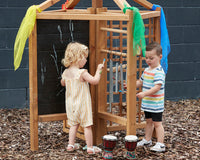Why should we learn to play instruments?
Music is for everyone, irrespective of age or gender. There is no age limit for taking "music lessons." Studies have shown that playing instruments not stimulates the ‘feel good’ or ‘happy hormone’ in our body but also help in our overall development. Learning an instrument has numerous benefits, starting from building confidence to increasing memory. Below we have mentioned some significant advantages of learning a musical instrument.
- Kids who take music classes are found to be smarter than kids of their age group who do not take music training. Learning an instrument improves various brain functioning, including abstract reasoning skills and memory, these skills are vital for understanding science and maths. Hence, learning to play a musical instrument can make you smarter.
- Learning to play a musical instrument also helps in improving your social life. During your music sessions, you meet new people and also develop qualities like teamwork and leadership.
- Playing an instrument is considered as in of the best ways to reduce stress.
- Learning an instrument increases patience in an individual.
- Music sessions also make trainees more disciplined and improve their time management skills.
- Playing music makes an individual more creative. Each player has his/her style of playing an instrument. When they play a particular tune, they tend to add their personality to it.
Learn to Play an Instrument
Learning an instrument is not a one day job. Learning to play an instrument takes time. Patience, hard work, and determination are qualities that are crucial for learning any musical instrument.

So, whether you want to learn an instrument for a hobby or dream of making a career in it, playing a musical instrument is worth your time and effort. Music not only stimulates our brain cells, but it also helps us in connecting with our soul.
Here are a few tips that might help perfect the art of playing a musical instrument.
Choosing an Instrument
If you are interested in playing an instrument, the first thing that you need to understand your interests and preferences. It is better to pick an instrument that you like. Learning to play an instrument needs hours of practice and dedication, so if you choose a musical instrument of your choice, it will act as a self-motivation.

If you don’t have any particular instrument in mind, it is advisable to start with a much simpler and less expensive musical instrument like a recorder or a guitar. Once you get your grip on it, you can always go for a harder level like a saxophone, cello, or drums.
Join Music Schools
After you have selected your instrument, next comes picking the right music school. You can get information about music schools from the internet. Check the reviews and feedback. Joining a music school would not only help you in learning the instrument but would also keep you disciplined. Besides this, it would give you a chance to meet new people and make new friends.

Music schools arrange events where their students can perform. Performing in front of other people would boost your confidence and keep you motivated to practice harder so that you can give your best.
In case there is no music school in your locality, you can always look for private music tuitions.
Use Online Resources if You Can’t Find a Teacher

If you are not able to find a good music teacher or a music school in your locality, or the expense of hiring a music teacher doesn’t suit your budget, no need to give up hope. You can still learn to play the instrument of your choice. All thanks to technology. You just need your musical instrument and a device with an internet connection. Many apps and websites provide free online coaching for playing an instrument.
Set a Goal for Playing Your Instrument
A goal provides you a direction. Having a goal keeps you motivated. Always try to set a realistic and achievable goal. In the beginning, try setting easier targets. You can keep on increasing the difficulty level of your goals with time.

Be very specific when it comes to goal setting. It is advisable to set long-term, as well as short-term goals. For example, being a part of your school band can be your long-term goal, whereas mastering your favorite song in two days can be your short-term goal.
Include Regular Practice as a Habit in Your Daily Routine
Learning an instrument requires regular practice. So, keep 30 minutes to an hour for daily practice. It would be better if you can play your musical instrument at the same time every day. After some time, it would become a part of your daily routine.

Daily practice of the instrument would increase your retention of the information. Mastering an instrument is all about dedication and practice. The more you will practice, the quicker you will learn to play the instrument. So be ready to pick up your instrument for training on days when you don’t feel like playing.
The Bottom Line
Select your instrument and music school wisely. Even if you are going for an online session, check feedback, and reviews.
The time of playing the instrument would be your time. So always remember that you wanted to learn an instrument because you liked it. So, relax and enjoy your music session.




















